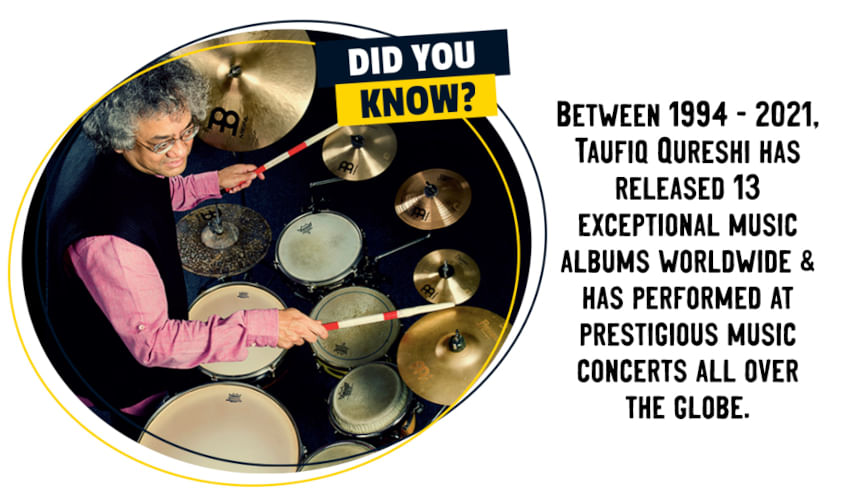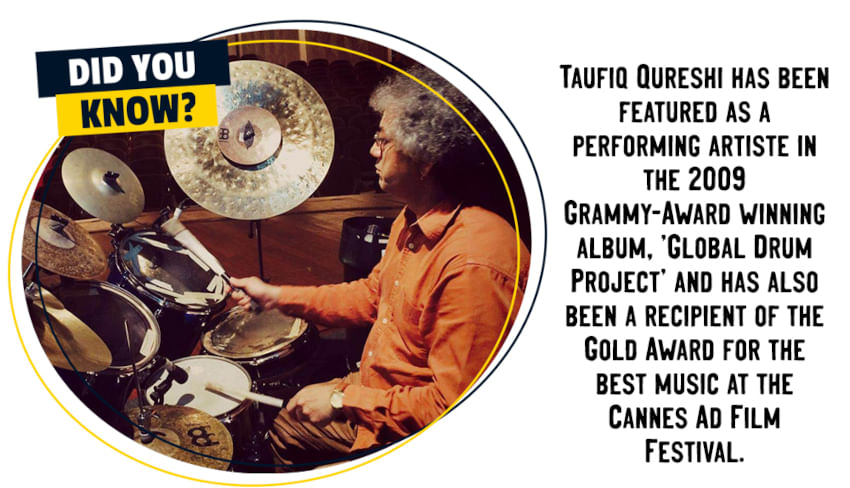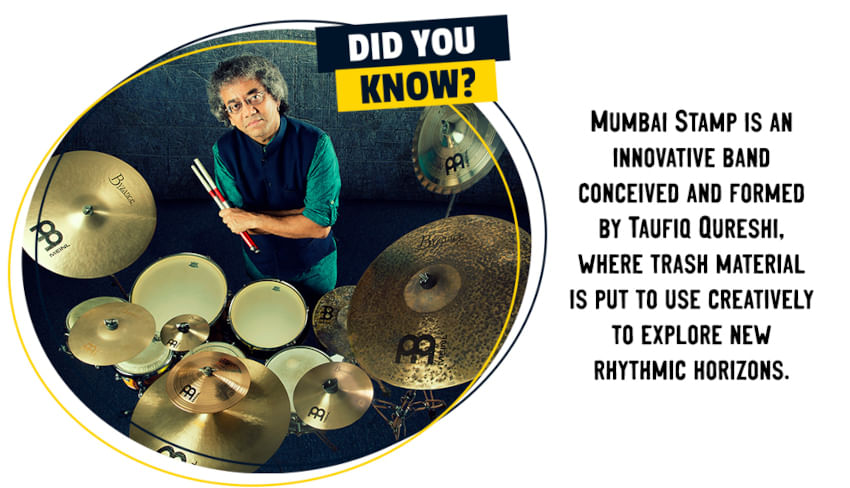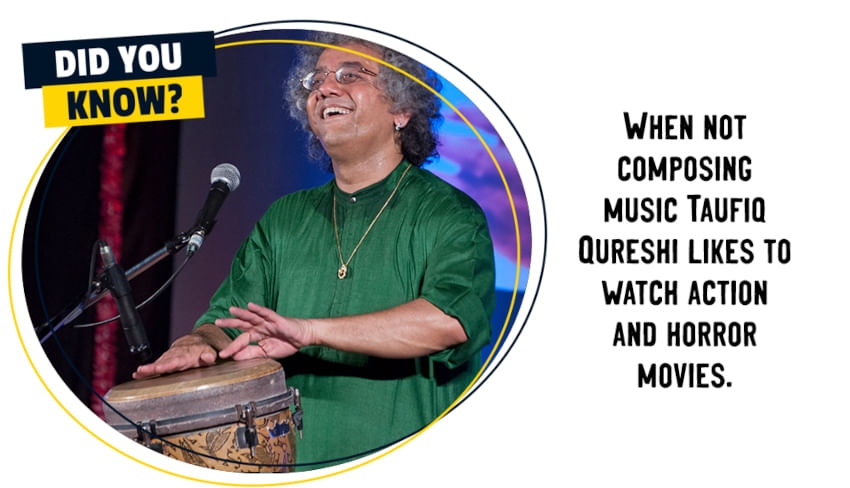TALKING MUSIC FEATURING TAUFIQ QURESHI
Taufiq Qureshi is a world-class percussionist, celebrated as the face behind raising the bar of innovations in the music industry to new heights. His compositions are often regarded to set new trends in the world of music. His unique abilities to create traditional and unconventional rhythms attract large audiences across the globe. Taufiq Qureshi is the son and disciple of legendary Tabla Maestro Ustad Allarakha, from whom he learnt the art of traditional Indian music and further developed it into remarkable rhythms and performances. Taufiq Qureshi shares some of his best experiences while Talking Music with Furtados!
Tell us a little about your Grammy Award Winning Album Global Drum Project? What was the thought process behind it? Did you always know it was destined for greatness?
Global Drum Project is the brainchild of great drummer Mickey Hart and Ustad Zakir Hussain. It also has Sikiru Adepoju and Giovanni Hidalgo in it so it was destined to be great. I was given total rhythmic freedom to work on the music. I heard the songs and layered my ideas onto them. At that point I didn't know how much of it would be used. But when the album was released, I realised I was part of 4 songs and a lot of my parts had been used. I feel very privileged to be part of this Grammy award winning album. I will always be indebted to Mickey Hart and Zakir bhai for this wonderful opportunity.
As a Rhythm Arranger/Percussionist/Composer for many blockbuster songs and background scores in Bollywood, do you have any favourites?
“Mere DholNa” from the movie Bhool Bhulaiyaa is one of my favourites. Another song that tops this list is the title track of Dhoom 2. That’s where Mumbai Stamp first came into Bollywood. In terms of background score I would go back to the film “Main Hoon Na''. There is a scene where Shah Rukh Khan chases the villain on the cycle. I did a lot of voice percussion, frame drums and big drums for the same. And of course Ranjit bhai added his beautiful colour with hits, string samples and melodic ideas. It was a beautiful score.

Picture credits: Vaibhav Kapadi
You have won many awards for unique jingles, is there any particular jingle that you are proud of?
I'm proud of the jingle that won the gold at Cannes Film Festival for the music for Indian Railway. It was a very famous song called “Rail Gadi” from the movie Aashirwad. I created the whole track using only voice and body percussion. So it's something I will always cherish. Another one is the “Nike Parallel Journey” for which I won bronze at Cannes. The same then won gold at The London International Film Festival.
Your way of playing the Djembe with traditional Tabla repertoire is unique. How did it all begin?
All the knowledge I possess is learnt on the Tabla. From an early age I wanted to transpose this knowledge on an instrument other than Tabla. I kept experimenting with different instruments till I found the Djembe. I noticed that the Tabla had 3 frequencies - the bass, the mids, the highs. The Djembe is one instrument which has all of these frequencies and I could perfectly adapt the tabla repertoire onto it. That’s how it all began.
What do you feel is the best song you have released and why?
Recently I released a song named The Musical Train in which I composed all the rhythm parts. I had not gotten the opportunity to play on my kit through the lockdown. So when I did, it felt nice to be back at my drum kit. It was a lovely chance to collaborate with my drums and cymbals as this song had a lot of Hits, Tukdas, Korvais and Runs. It’s definitely one of the best songs I have released in a long time.

Which is your most favourite performance upto date?
One performance that particularly comes to mind was in Delhi around 3 years ago. It was the HCL concert series featuring myself, Rakesh Chaurasia, Purbayan Chatterjee, Kaushiki Chakraborty & Satyajit Talwalkar. The concert gave me a chance to play and interact with fabulous musicians that I will cherish forever.
What do you do when you have an artistic block?
I take a break from music. I go watch a movie or use my mobile. I avoid listening to music at that time. One thing that helps me, is that I start practising. I use my Djembe or my drumkit and I exercise. I don't think of anything else. I've realised music is one of the best ways to relax.
How did Surya - The New Sun come together? What is your vision for your music?
Surya is a very old band of mine that was formed in college. In 1985, I collaborated with a friend of mine, Nitin Shankar a Conga player. At the time of registration, they asked for a name to represent the band. I was thinking about it and staring up at the St. Xavier’s college building when I saw the Sun and that's how it first got the name “Surya”. Over the years Surya has had collaborations with many musicians. Nitin Shankar, Salim Merchant, Shankar Mahadevan, Sridhar Parthasarathy. We have also featured Zakhir bhai and Sultan Khan Sahab as guest artists. However when everybody got busy with their own jobs, the Sun set on Surya for a while but in time it rose again with new band members. This time I was joined by Sarang Kulkarni, Abhay Nayampally, Atul Raninga and Shikhar Naad. That's how Surya - The New Sun came together. For Surya I am the common factor and other musicians add to it. That’s my vision for it.

Picture credits: Vaibhav Kapadi
Your band Mumbai Stamp always manages to drive the audience and is a spectacle to watch. What was the thought process behind the band?
Mumbai Stamp is a rhythmic band.The idea behind it came when I would travel through Mumbai and see trash being dumped. I had seen Stomp and I knew the concept behind it. I said to myself, why throw away things? Let's try to make the best use of it. That’s the idea behind Mumbai Stamp. Even today, all the material you see, it was originally meant to be discarded. People call it trash. I call it an identity of rhythm. It's a way to create rhythm. For me, they are all instruments. I try to define the North and South Indian rhythmic ideas that I have learnt, through trash,bucket bins, plastic cans etc.
How do you think social media has impacted your music?
I think social media during the covid time has been very impactful. Currently there are no concerts happening, so uploading music on social platforms is getting musicians a lot of support. Infact, I started my Instagram account during the lockdown period on the occasion of my father’s birthday. I realised I could reach a larger audience through social media. Now I'm in one part of the world, reaching out to people across the globe.
Do you have any pre concert rituals?
There are a couple of things I do. Firstly I don't like to think about the concert. I let things flow their way. Secondly, I fold my legs and my hands keep playing on them; It helps me to warm up before the concert. Lastly, I like to have a cup of “garma-garam chai and Biscuits”
What was the last song you played on your phone?
The last song I played on my phone was the song I composed for my father’s 100th birth anniversary. It’s called “Alla ne Rakha” It’s a song very close to my heart.
What is your favourite way to spend time when not composing or playing music?
I like to watch movies or serials. I don’t like to watch anything serious. It has to be either action or horror. That’s my favourite pastime

Picture credits: Sona Sohani
Your advice to the younger generation of musicians?
In these covid times, I understand the struggle one must be going through to find motivation. I would say keep your focus on your practise. “Riyaaz” is very important to become a good musician. Focus on your work. Don't compare yourself to others.Where music is concerned, have faith in yourself and in your music.
How would you like to be remembered?
I would like to be remembered as a good person. Somebody who pursued his music committedly, honestly and without any fear. Somebody who played music for his audience, straight from his heart.